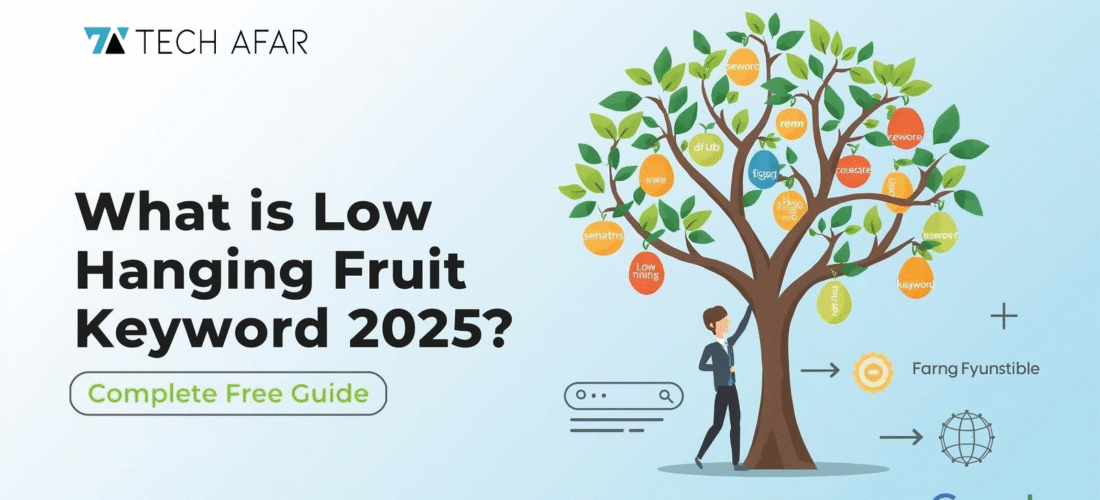Have you ever tried to pick an apple from the very top of a tall tree? It’s hard work! But the apples on the lower branches? Those are easy to grab. Think of “low hanging fruit keywords” as those easy-to-reach apples in the world of Google searches. They are simple phrases that people type into Google, which are easier for a new website to rank for. In this article, we’ll explain exactly what these keywords are, why they are your secret weapon for getting free traffic, and show you simple steps to find them. We promise to explain it so clearly that even a 5th-grade student can understand and start using these tips right away!
What Are Low Hanging Fruit Keywords?
Simply put, low hanging fruit keywords are specific search terms that are easier for your website to appear on Google’s first page for. They aren’t the super popular, one-word keywords that millions of big websites are fighting over. Instead, they are longer, more specific phrases that have less competition.
What Does “Low Hanging Fruit” Mean?
The phrase “low hanging fruit” comes from fruit picking. It’s a metaphor for choosing the goals that are easiest to achieve first. In SEO, it means targeting the keywords that will give you the best results for the least amount of effort. You go for the quick wins to build momentum.
Why is Low-Hanging Fruit SEO Important?
Starting with these keywords is like learning to ride a bike with training wheels. It sets you up for success without the immediate frustration.
-
Less competition: Since these are specific phrases, fewer websites are actively trying to rank for them. This gives your new or small website a real chance to be seen.
-
Higher rankings: With less competition, it’s much easier and faster to get your content to appear on page one of Google.
-
Less time and effort: You don’t need to spend months creating a massive, perfect article. A well-focused blog post or page can often do the trick.
Types of Low-Hanging Fruit Keywords
Here are some of the most common and effective types of easy-to-rank keywords:
-
Commercial Keywords: These show that a user is researching before buying (e.g., “best laptop for students,” “affordable running shoes”).
-
Question-Based Keywords: People type full questions into Google (e.g., “how to fix a leaky faucet,” “what is SEO?”).
-
Local Keywords: These include a city or area name (e.g., “plumber in Chicago,” “best pizza near me”).
-
Branded Keywords: These include your brand or a competitor’s brand name (e.g., “Nike running shoes,” “Apple iPhone 15 features”).
-
Transactional Keywords: These show a strong intent to buy (e.g., “buy coffee maker online,” “order flowers today”).
6 Tips on How to Find Low-Hanging Fruit Keywords
-
Use SEO Tools: Free tools like Google Keyword Planner or Ubersuggest can show you keywords with high search volume but low competition.
-
Apply A-Z Modifiers: Add words like “for,” “with,” “without,” “how to,” or “best” to your main keyword to find specific long-tail versions.
-
Analyze Competitors’ Content: Look at what your successful competitors are writing about. Tools can show you which keywords are bringing them traffic.
-
Identify Keywords on the 2nd SERP Page: Look at the websites ranking on Google’s second page. These keywords are almost ranking and are often easy to target.
-
Leverage Voice Search: People use full, conversational sentences with voice search (e.g., “OK Google, where can I find a vegan recipe for chocolate cake?”). Target these natural phrases.
-
Keep an Eye on Emerging Trends: Use Google Trends to spot new, growing topics that don’t have a lot of content written about them yet.
Frequently Asked Questions
1. How long does it take to see results from low-hanging fruit keywords?
While it varies, you can often see traffic increases within a few weeks to a couple of months, which is much faster than targeting highly competitive terms.
2. Can I only use long-tail keywords for my website?
In the beginning, focusing on them is a great strategy. As your site gains authority, you can gradually start competing for more popular keywords.
3. What’s the difference between a long-tail keyword and a low-hanging fruit keyword?
All low-hanging fruit keywords are typically long-tail, but not all long-tail keywords are low-hanging fruit. “Low hanging fruit” specifically refers to long-tail keywords with low competition.
4. Are question-based keywords really that effective?
Yes! They are fantastic because they directly match a user’s search intent, and you can provide a clear, helpful answer that Google loves to feature.
5. Do I need expensive tools to find these keywords?
No, you can start with free tools like Google’s own Keyword Planner and Google Trends. The strategies matter more than the cost of the tool.
Conclusion
Targeting low-hanging fruit keywords is the smartest first step in SEO. It’s a strategy that focuses on quick, achievable wins to build your website’s traffic and authority. By starting with specific, less-competitive phrases, you can get valuable visitors from Google without an uphill battle. Remember, every big website started small. Begin by picking the easy fruit, and you’ll soon be ready to reach for the top branches.




